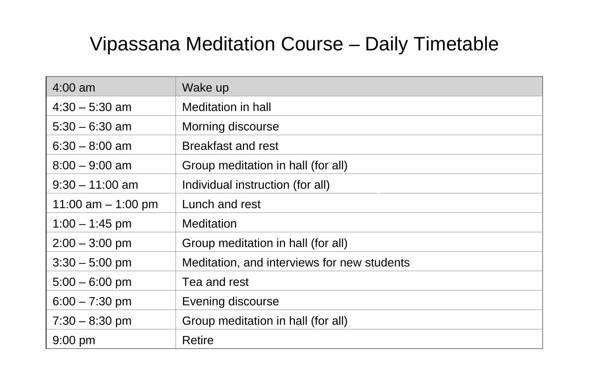
Vipassana: what is it?
PAST EVENTS

Scroll down for the English version.
यस कथाका पात्रहरू काल्पनिक होइनन्।
हामीमध्ये धेरैले सानो हुँदा, बादल पारि माथि आकाशमा भगवानको बास हुन्छ भन्ने पक्कै पनि सुनेका थियौँ। अर्को मिल्दोजुल्दो कथा - देवता र असुरहरूबीच अमृत को लागि दूधले बनेको महासागरमा ठूलो युद्ध भएको थियो रे।
यस्तो किसिमको श्रद्धा विशेषगरी हिन्दू वा बौद्ध संस्कारमा हुर्किएकाहरूमा देख्न सकिन्छ।
केही शताब्दी पछाडि जाने हो भने ‘संस्कार’ भन्ने शब्दको पनि गहिरो र फरक अर्थ छ ।
किन गरिस मङ्गले, आफ्नै ढंगले भनेझैँ — हामीले जे सुन्यौं, जे बुझ्यौं, जे तर्कसंगत लाग्यो, अर्थ बुझी न बुझी तोतेझैँ दोहोर्यायौ र त्यही धारण गर्यौं , त्यही हाम्रो लागि सत्य बन्न गयो । दोहोरिने क्रियाकलापहरूबाट संस्कार निर्माण हुन्छ।
यदि ‘संस्कार’ शब्द अलि अपरिचित लाग्यो भने, यसलाई ‘धर्म’, ‘धम्म’, ‘प्रकृति’, ‘शरिया’, ‘सार्वभौमिक नियम’ आदि रूपमा बुझ्न सकिन्छ - यी शब्दहरू सबै एउटै बगैंचाका विभिन्न रंगका फूलहरू जस्तै हुन्। अनि यही संस्कारले हाम्रो भविष्यको निर्माण गर्छ।
अर्को रूपमा हेर्ने हो भने, हामी हाम्रो संस्कारका दास हौं।
संस्कार के ले बन्छ त?
जब धेरै आसक्ति बढ्छ, हाम्रो संस्कार पनि बलियो बन्छ। आसक्ति तब बढ्छ, जब हामी कुनै वस्तु, व्यक्ति, वा विचारप्रति अत्यधिक मोह राख्छौं। केही उदाहरणहरू परिवार प्रति आसक्ति, सामग्रीक सम्पत्ति , स्मृति र विगतका अनुभवहरू, नियन्त्रण र सुरक्षा प्रति ।
नतिजा?
जति धेरै हामी कुनै कुरामा जकडिन्छौं, त्यति नै त्यो हाम्रो संस्कारको हिस्सा बन्छ।
तर संस्कार केवल पूजा-प्रार्थनाले मात्र परिवर्तन हुँदैन। यो त त्यही कुरा भयो—चाबी घरभित्र हरायो, तर म बाहिर खोजिरहेछु किनभने बाहिर उज्यालो बढी छ।
अब केही सकारात्मक कुरा गरौँ:
खुशीको कुरा के भने, हामीसँग हाम्रो संस्कार परिवर्तन गर्ने उपाय छ। त्यो उपाय भनेको बुद्धले देखाएको मार्गमा हिँड्नु हो: “एहि पस्सिको” (Ehi Passiko) – आफैँ आएर हेर, जाँच गर, अनि अहिले नै लाभ उठाऊ।
विपश्यना अभ्यास गर्दै जाँदा यी कुराहरू स्पष्ट हुँदै जान्छन्।
यो अभ्यासले प्रतिक्रिया नगरी हेर्न सिकाउँछ, सुख आओस् या दुःख - दुवैको स्वभाव क्षणिक हो। पहिले सुख दुःख भावनाले मन उत्तेजित हुँदा दुःख बढिरहेको थियो, तर अब केवल वर्तमान क्षणलाई हेर्नाले मन शान्त छ - यो एक महत्वपूर्ण अनुभूति हो र यही परिवर्तनले नै जुनि जुनि देखि एउटै दिशा मा घुमिरहेको चक्र उल्टाउँछ।
अहिलेको युगको अर्को चुनौती:
कसैसँग समय नै छैन— मर्नु फुर्सद छैन भने झैँ, ध्यान गर्न समय निकाल्ने कुरा परै जाओस्।
तर विपश्यना संकल्प माग्दछ, कम्तीमा १० दिन केन्द्रमा बस्नैपर्छ।
यदि त्यो सम्भव छैन भने, सानो-कदमबाट अगाडि बढ्नुहोस्, तात्कालिक सन्तुष्टिको (instant gratification) पछि नलाग्ने वा धैर्यले प्रतिक्षा गर्ने बानी सुधार्नुहोस्।
यी दुई चीजहरूमा हामीले सुधार गर्न सकेमा, यसले हामीलाई आन्तरिक शान्ति दिनेछ।
अनि प्रगति भएको छ कि छैन भनेर अरूसँग सोधिरहनु आवश्यक छैन ।
प्रगतिको दुई परिमाण छन्:
1. सहयोगी भावना वृद्धि हुनु (the act of giving)
2. आभार प्रकट गर्ने भावना बढ्नु (Gratitude)
जहाँ सही हुनुभन्दा पहिलो ( to be first) हुनुलाई बढी मूल्य दिइन्छ, त्यहाँ आन्तरिक शान्तिलाई सफलता मापन गर्ने आधार बनाऔँ।
This story’s characters are not fictional.
As kids, many of us heard that God lives above the clouds. We also grew up with the story of gods and demons battling in an ocean of milk over Amrit rash, a divine nectar.
Such beliefs are particularly common among those raised in Hindu or Buddhist sanskar.
Looking back several centuries, even the word ‘sanskar’ had a deeper and different meaning.
Like the old saying goes, “kina garesh mangale, afnai dhanga le” - whatever we were taught—what we heard or saw. Sometimes it felt right, and other times, we accepted it without thinking or questioning. Through this repetition, those ideas became our truth, shaping our sanskar.
If sanskar seems unfamiliar, it can be understood as dharma, dhamma, prakriti, sharia, or universal law. Like different-coloured flowers in a garden, these words share the same essence. Our sanskar shapes our life, like a director guiding the movie where we are the main character.
What Forms Our sanskar?s
The stronger our attachments, the deeper our sanskars.
Attachments grow when we develop an excessive emotional or material connection—to people, possessions, memories, past experiences, control, or security.
Some sanskars fade like lines in the sand, while others stay with us like carvings in stone, shaping who we are.
The result?
The more we hold onto something, the deeper it becomes part of our sanskar.
But sanskar doesn’t change just with prayer or rituals. They can help, but some are so deeply rooted that real change needs deeper effort.
It’s like losing your keys inside the house but searching outside just because the light is better there.
So far, we have focused on the pessimistic aspects—now, let's explore some positive ones.
The good news is that we can change our sanskars. The key lies in walking the path shown by the Buddha:
“Ehi Passiko” – Come, see for yourself, test it, and experience the benefit here and now.
Through Vipassana meditation, these truths become clearer.
The practice trains us to observe without reacting—whether pleasure or pain arises, we simply watch, realising their fleeting nature.
Previously, our emotions controlled us, increasing suffering. Now, by staying present, the mind remains peaceful. It reverses the endless cycle of our sanskars in which we have been trapped for lifetimes.
The Challenge of Our Times
Another challenge in today’s world is that no one seems to have time—people are so busy, as the saying goes, "marna fursad chaiina, dhyan kaha bata garna jane." But Vipassana requires dedication—at least 10 days in a retreat centre.
If that isn’t possible, start with these small steps.
a. resist the urge for quick rewards (instant gratification) and b. develop the hide of an elephant (practice patience). Bonus: c. adopt the ethics of a bee (avoid lying or deceiving).
Even these small changes can bring deep inner peace.
You don’t need others to validate your progress.
Two clear signs of growth: feeling happier when giving and more grateful when receiving.
In a world that values being first over being right, let’s redefine success—not by external achievements, but by inner peace.
Albert Einstein supposedly stated, “The religion of the future will be a cosmic religion. It should go beyond a personal God and avoid dogma and theology.” The phrase "personal God" seems to suggest a God or Gods shaped by our own sanskar.
Vipassana
You didn’t come this far to stop


A ten-day Vipassana meditation course is a practical training in the Buddha’s Eightfold Noble Path, structured around morality, concentration, and wisdom. Students begin by observing the five precepts to cultivate purity in actions and speech, providing the ethical foundation for practice. Concentration is then developed through Anapana meditation—mindfulness of breathing—which calms and steadies the mind, making it clear and focused. Building on this, Vipassana meditation is introduced to cultivate wisdom by directly observing the impermanence, unsatisfactoriness, and selfless nature of all phenomena. Through this experiential process, meditators gradually detach from craving and aversion, purify the mind, and gain inner peace. Regardless of religion or background, participants can benefit from improved concentration, clarity, and freedom from suffering, with the ultimate goal of progressing toward Enlightenment (Nibbana).
Modern Global Teachers (20th–21st Century)
Sayamagyi Daw Mya Thwin 1953 - 1971 - Sayamagyi Daw Mya Thwin (Mother Sayamagyi) was Sayagyi U Ba Khin′s foremost disciple. She practised and taught with Sayagyi from 1953 until his demise in 1971.
S. N. Goenka (1924–2013) – Most influential global lay teacher of vipassanā (from U Ba Khin lineage); established 10-day courses worldwide.
Sayadaw U Pandita (1921–2016) – Successor of Mahāsi Sayadaw; emphasized rigorous, disciplined practice.
Sayadaw U Tejaniya (b. 1962) – Teaches a relaxed, awareness-based approach to mindfulness in daily life.
Joseph Goldstein (b. 1944) – Co-founder of Insight Meditation Society (IMS), USA; one of the most respected Western vipassanā teachers.
Sharon Salzberg (b. 1952) – Co-founder of IMS, well known for integrating loving-kindness (mettā) with vipassanā.
Jack Kornfield (b. 1945) – Co-founder of Spirit Rock Meditation Center; key figure in bringing Theravāda and vipassanā to the West.
International Meditation Centre (IMC UK) — Heddington
Address:
International Meditation Centre
Splatts House | Heddington | CALNE | SN11 0PE
(internationalmeditationcentre.org
Dhamma Dīpa
Address:
Vipassana Trust | Dhamma Dīpa | Hereford
HR2 8NG
United Kingdom uk.dhamma.org/herefordshire-centre/
Amaravati Buddhist Monastery
Address:
Hemel Hempstead
Hertfordshire
HP1 3BZ
United Kingdom Amaravati Buddhist Monastery | UK |
